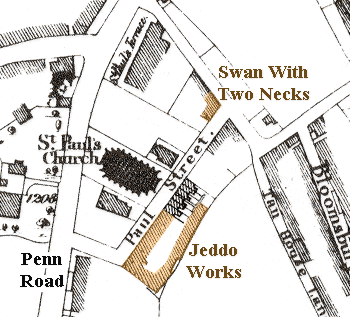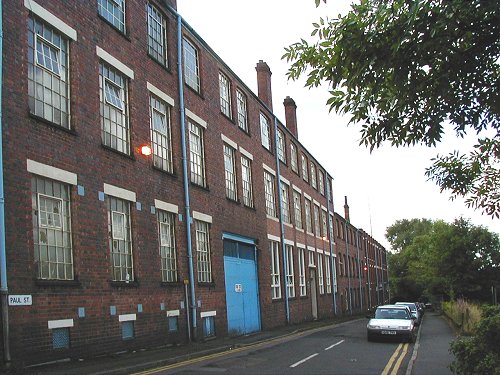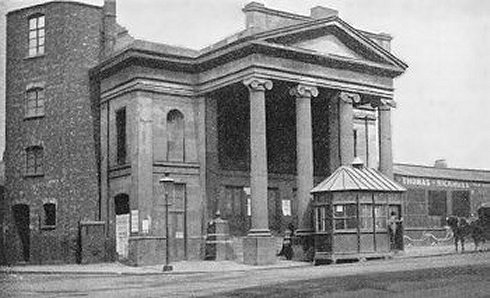|
The
strike at Jeddo Works
Edward Perry was clearly a
strong-willed man who felt that he could stand up to the
forces of adversity. William Highfield Jones described
him as follows:
Edward Perry was of medium height,
a thin wiry man, with a fidgety manner and of a restless
disposition. He had dark piercing eyes, and an incisive
way of speaking. His promptitude in emergencies was
remarkable, and he proved himself to be a man of great
determination. Mr. Perry had a good knowledge of the
rights of capital and labour, and especially of the laws
relating to conspiracy, and he felt sure the ignorance,
and the enthusiasm of the working men would give him an
advantage which he would be prompt to take.
The two London delegates, Peel and
Green organised the strike, and used the Swan with Two
Necks pub at the top of Paul Street as a base. They
formed a strike committee to meet daily in the pub, and
appointed 5 workers as committee members, each being
paid 4 shillings and sixpence a day, and an extra
sixpence for drink. The members were: George Duffield,
John Gaunt, Charles Piatt, Henry Rowland, and Thomas
Woodnorth. |

Edward Perry. From "The Mayors of
Wolverhampton" by John Jones. |
When the strike began, Perry
advertised for men to replace those on strike. In
response the union circulated posters warning men not to
work for Perry, who was described as a tyrant who paid
half the going rate.
The committee kept an eye on the
factory through the windows of the pub, and sent groups
of men to the entrance gate to intimidate those still at
work. They also attempted to prevent anyone entering the
factory who was seeking work. The strikers shouted at
the workmen as they came to and from work, calling them
‘blacklegs’, ‘rats’ etc. and threw dead rats at them.
They also hung dead rats around the works entrance.
Not satisfied with their actions,
the committee managed to convince some of the older
apprentices to stay away, and sent them to other towns
where they were looked after. They also allured some of
the workers, who were on a long term contract with
Perry, into the pub, got them drunk, and conveyed them
to the railway station where they were put on trains and
sent to distant parts. They also gave money to the
families of the strikers.
This continued for 8 months, after which most of
Perry’s workers were on strike. He was unable to fulfil
any outstanding orders, but being the man he was, he had
spies everywhere, who kept him informed of the actions
of the strike committee. |
| One of them was his nephew George Winn, who
sympathised, and drank with the strikers to gain their
confidence. He discovered where some of the hired men
who had been spirited away by the committee were living.
On hearing of this, Perry instantly sent warrants for
their apprehension. Some were sent to prison, and others
went back to work after paying costs. One of them had
caught a severe cold whilst away, and on return to
Wolverhampton he died.
Things Worsen |
|
The trade association attempted to
intimidate Edward Perry even further by sending him
anonymous letters. In them he was described as a
murderer, and threatened with his life.
One night a large chalk drawing of
a coffin appeared in front of the works, bearing the
words “E. Perry, prepare to meet thy God”.
Comical verses were written about
him and sung in the streets of the town. Out of the 59
hired workmen still at the factory, 18 had been spirited
away by the committee, which was aided by delegates from
London, who actively helped in getting the workmen away. |

| The location of
Jeddo Works. From Joseph Bridgen’s map of
1850. |
|
|
Perry then attempted to attract
some of his old hands who were working at the Old Hall.
He offered them good wages, and a bonus of five pounds
to return. When several of them returned, it incensed
the other workers at the Old Hall, who had each been
paying four shillings a week to support the strike.
When the next man was about to
leave and return to Perry, his colleagues decided to get
their own back. His name was Tom Jones. They waited for
him to receive his wages, then formed a circle around
him, and treated him in a barbaric manner, shouting,
booing, and beating iron pans. As he managed to make his
escape, the police closed the street and forced the howling
mob back into the works.
The
European Connection
In an attempt to defeat the strike,
Perry sent his nephews George Winn, and his brother
Alfred to France to hire thirty tinmen. Alfred could
speak French and so acted as the interpreter. Twenty
eight men signed an agreement to work for Perry for
twelve months and soon arrived at Wolverhampton railway
station where they were met by Edward Perry and his
solicitor Henry Underhill. On their march to the works
they were tormented and intimidated by the mob. The poor
Frenchmen were terrified by the ordeal, made worse
because they could not understand a word of English.
Perry provided lodgings for them
near the works. The strike committee were determined to
convince them to leave, and paid an old French soldier
named Mayeurs, to talk to them. He soon convinced them
to return home, informing them that the union would give
a handsome present to each man, and pay their fare home.
They were in a frightening situation and only too happy
to leave. Had they known of the strike beforehand, they
would certainly not have come.
The committee was jubilant with
their success. They formed a procession, and paraded
through the streets with the Frenchmen as they made
their way to the railway station. Flags and banners were
waved, and a brass band played:
“See the conquering hero comes,
Blow the trumpet, beat the drums.” |

A view of Paul Street in 2001.
Jeddo Works was at the far end of the street on the
left, and the Swan With Two Necks was in the foreground
on the right, where the tree is standing. |
The committee and strikers were in ecstasy, they
thought they had won their fight, but Edward Perry was
made of sterner stuff.
He quickly arranged for his nephews to go to Germany in
secret and return with 30 German tinmen. They placed
adverts in German newspapers and soon engaged 30 men to
work for 12 months, along with an interpreter. While
this was happening, Perry organised sleeping quarters
for them at the works, and on their arrival in
Wolverhampton, secretly conveyed them in closed
carriages. At the factory the gates were closed, and all
their needs were catered for, so that no outside
communication with the strikers was possible. |
|
The public meeting
The strike committee, who had no
idea of what was happening, were furious. They were
powerless to intervene, and were anxious because the
reserve fund was exhausted. They stepped-up their
campaign against Perry’s workmen, intimidating and
ill-treating them worse than ever. One of them, John
Briggs, was knocked down and assaulted in a public
house. The man who committed the offence was brought
before the magistrates and fined 40 shillings and costs.
The strike committee felt that they
were loosing public sympathy and so called a mass
meeting at the Theatre Royal in Cleveland Road. They
placed large numbers of posters around the town,
inviting workmen to come along to assist them in
fighting the tyranny of the employers.
The meeting, held on Tuesday, 22nd October, 1850 was presided
over by Samuel Griffiths, a businessman, merchant and
factor, who drifted into the iron trade, and came to
intimately know the industry. Several people spoke to
the audience, including Mr. A Fleming, treasurer of the
union, Mr. Peel, union secretary, Mr. Bartlett,
solicitor of the strike committee, and Mr. Green, the
union delegate from London.
They all spoke at length about the rights of
the workers, and their determination to fight the
employers to the bitter end. The employers were
criticised for their tyranny, and Perry was castigated
for his treatment of the hired hands who were forced to
return to Wolverhampton. |
| After the meeting, Perry appealed to the mayor for
police protection for his employees, stating that they
were threatened with violence by the strikers.
On Thursday 24th October, the mayor, George Robinson, and four
magistrates, Whitgrave, Fryer, Walker, and Andrews held
a meeting at the Town Hall with Edward Perry and the
London trade delegate, Mr. Green, in an attempt to
resolve the situation. Both sides were deeply
entrenched, and so the attempt failed. |

The Theatre Royal in Cleveland
Road. |
|
Edward Perry Fights Back
The strike continued for month
after month, and Edward Perry collected evidence in
support of a charge of conspiracy against the strike
leaders. The members of the strike committee, Duffield,
Gaunt, Piatt, Rowland, and Woodnorth were indicted for
conspiracy, as were the London delegates.
The trial took place at Stafford
Assizes in August 1851 with Mr. Justice Erle presiding.
Perry called many of his workmen as witnesses, and the
union produced a copy of their rates book, stating that
Perry’s wages were considerably less than those paid by
other employers. Perry said that this was because he had
gone to great expense to automate the manufacturing
process. He showed the court two colanders, one made the
old fashioned way, by hand, and another made in one
piece by machine. The hand-made colander consisted of
seven pieces of tin which were raised, punched, and
jointed together by the tinmen, who were paid twelve
shillings a dozen for the job. The other colander was
completely produced by machine, except for the fitting
of the handle. For this the tinmen were paid one
shilling a dozen, but because of the speed of the
process, and the large numbers produced, the tinmen
actually earned more money.
The jury were greatly impressed
with Perry’s argument, and found the defendants guilty
of conspiracy. The counsel for the defendants
immediately appealed against the verdict on technical
grounds, and so the defendants were bailed until the
case could be heard in London before the judges.
Back in Wolverhampton the
defendants summoned Edward Perry before the local
magistrates on a charge of perjury for remarks he made
during the trial. After hearing statements from both
sides the Wolverhampton magistrates dismissed the
charge.
The
final outcome
The appeal was heard on 26th
November, 1851 by Lord Campbell, and justices Patteson,
Coleridge, and Erle. The appeal was rejected, and a
sentence of 3 months imprisonment with hard labour was
imposed on the London delegates; W. Peel, T. Winter, and
F. Green, and also on 4 members of the strike committee;
Rowland, Gaunt, Duffield, and Woodnorth. The 5th member
of the committee C. Piatt was let off with one month’s
imprisonment. Each of them had to pay a fine of 1
shilling and costs, which were very high. They were sent
to Stafford Gaol to serve their sentence.
As a result of the high costs
involved, the National Trade Association was declared
bankrupt. The men were now penniless, and liable to a
long term of imprisonment because of their inability to
pay the heavy costs. Unsuccessful attempts were made to
raise the money by subscription, and so they appealed to
Edward Perry, who generously paid the remainder of the
costs, so allowing them to leave prison.
The strike ended after 18 months,
and the unions decided to leave the employers alone,
which they did for nearly 30 years.
Edward Perry was twice elected
Mayor of Wolverhampton, first in 1855, and again in
1856. He married Sophia, but had no children. In
1856 he was one of the founders of the Wolverhampton
Chamber of Commerce, and its president from 1856 until
1864. Just before his death in 1871 he built a large
house at Tettenhall called ‘Dane’s Court’ but sadly
didn’t live long enough to settle in. When the house had
been completed, he was taken ill and soon died.
By the 1880s, the japanning and
tin-plate industries were in decline, mainly due to
changes in fashion, and the development of
electroplating. The over-decorated and fussy designs
greatly appealed to the Victorians, but not to later
generations. The last vestiges of the industry had more
or less disappeared by the 1920s.
References:
| W. H. Jones, |
"Japan, tin-plate working, and bicycle
and galvanising trades in Wolverhampton",
Alexander and Shepheard Limited, London,
1900. |
| John Jones, |
"The Mayors of Wolverhampton" vol.1,
Whitehead Brothers, Wolverhampton, 1880. |
| Frank Mason, |
"The book of Wolverhampton", Barracuda
Books Limited, Buckingham, 1979. |
|
 |
|
 |
Return to
unrest and the strike |
|
Return to
the beginning |
|